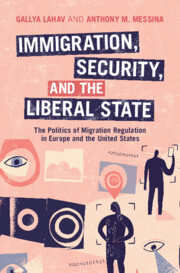‘Lahav and Messina’s multi-method research design effectively synthesizes significant empirical data derived from a variety of longitudinal and cross-national public opinion surveys, as well as media content analyses and demographic data. The product of this synthesis is a novel insight into the linkage between migration and security in the liberal state.’
Ariane Chebel d'Appollonia - Professor, School of Public Affairs and Administration, Rutgers University, Newark
‘Based on extensive empirical research on public attitudes, media framing and political party positioning on security threats, Immigration, Security and the Liberal State effectively challenges comparative analysis focused on constraints that rights and markets impose on policymakers’ efforts to restrict immigration, and offers a new conceptual framework that systematically integrates the security dimension for understanding the politics of immigration in a post-9/11 world - a work that will set the terms for debate well into the future.’
Rey Koslowski - Professor of Political Science, Rockefeller College of Public Affairs and Policy, University at Albany, State University of New York (SUNY)
‘This book brings together many years of research by both authors in analysing immigration policy in wealthy western democracies. Lahav and Messina argue that immigration policy in liberal democracies is a function of the ‘frames’ that are employed by political elites and the media. The economic and rights-based frames that have been prominent in the post-World War II period have been displaced by a security frame, which allows states to adopt policies that undermine the civil liberties of both citizens and migrants. This represents a substantial contribution to our understanding of the regulatory framework of immigration policy in liberal democracies in the contemporary era, which also has implications for the quality of governance in our societies. It will make a big splash, probably stir a lot of controversy and reframe the debate on a central issue in public affairs today.’
Jeannette Money - Professor, Department of Political Science, University of California, Davis
‘[This] book will be useful to anyone interested in immigration policy. Its extensive examination of the role of noncentral state actors - subnational governments and private entities - in immigration policy addresses an important development that has received little attention … Recommended.’
A. L. Aoki
Source: CHOICE



